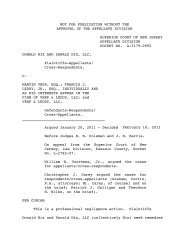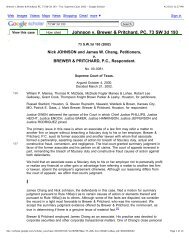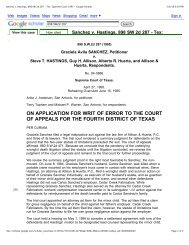Sebree v. SCHANTZ, SCHATZMAN - Legal Malpractice Law Review
Sebree v. SCHANTZ, SCHATZMAN - Legal Malpractice Law Review
Sebree v. SCHANTZ, SCHATZMAN - Legal Malpractice Law Review
You also want an ePaper? Increase the reach of your titles
YUMPU automatically turns print PDFs into web optimized ePapers that Google loves.
<strong>Sebree</strong> v. <strong>SCHANTZ</strong>, <strong>SCHATZMAN</strong>, AARONSON, 963 So. 2... http://scholar.google.com/scholar_case?case=11909677649313...<br />
845<br />
and set aside," there is no further identification of the default final judgment either by date or<br />
book and page recording information.<br />
After entry of the Agreed Order, proper service was achieved on <strong>Sebree</strong> and from April 14,<br />
1999, through August 12, 1999, the parties litigated the reconstituted case. <strong>Sebree</strong> filed an<br />
answer to the complaint and a legal malpractice counterclaim. Schantz, Schatzman, still<br />
self-represented by attorney Pico, responded with a reply and avoidance of affirmative<br />
defenses, a motion for enlargement of time, a motion to dismiss counterclaim, and a notice of<br />
taking deposition of Michelle <strong>Sebree</strong>. The signature block on each of the law firm filings reads<br />
as follows:<br />
Respectfully submitted, <strong>SCHANTZ</strong>, <strong>SCHATZMAN</strong>, AARONSON & PERLMAN, P.A. Attorneys<br />
for SSA & P, P.A. Suite 1050 — First Union Financial Center 200 South Biscayne Boulevard<br />
Miami, Florida XXXXX-XXXX Telephone: (305) 371-3100 By: _____________________<br />
MARTIN PICO, ESQUIRE Florida Bar No. 0092002<br />
The last evidence of record activity during this time period is a nineteen-day Notice of<br />
Unavailability filed by counsel for <strong>Sebree</strong> on August 12. Forty-five days later, Schantz,<br />
Schatzman ceased doing business and merged its practice with another local law firm. Pico<br />
did not join the migration, but went his own way. For the next three and a half years, there<br />
was no filing of record in this case on behalf of either Schantz, Schatzman or <strong>Sebree</strong>. At<br />
some point, the trial court docket apparently began showing the case as closed.<br />
Purportedly prompted by a call from a title company for a pay-off figure on the default final<br />
judgment, Schantz, Schatzman sought to locate both its litigation file and the court file in<br />
February of 2003. Neither could be found. [1] However, the law firm was able to obtain a copy<br />
of the default final judgment from the public record and initiated non-record collection activity<br />
with the Office of the Miami-Dade County Sheriff. [2] Somehow apprised, <strong>Sebree</strong> countered on<br />
April 3, 2003, with the first filing in the trial court since August 12, 1999, a Motion to Dismiss<br />
pursuant to Florida Rule of Civil Procedure 1.420(e). After affording the parties—now<br />
represented *845 by new counsel—a full hearing, the trial judge denied the motion to dismiss<br />
on June 16, 2003, based upon what the trial court considered to be "the very unusual set of<br />
facts and circumstances of this case." The judgments on appeal followed. The validity of<br />
those judgments rises or falls on the validity of this interlocutory order. We apply an abuse of<br />
discretion standard to our review of this order. See Metropolitan Dade County v. Hall, 784<br />
So.2d 1087, 1090 n. 4 (Fla.2001); Lang v. Mason 911 So.2d 167, 169 (Fla. 2d DCA 2005).<br />
ANALYSIS<br />
Florida Rule of Civil Procedure 1.420(e), as it existed at the time of the ruling by the trial court<br />
below, read:<br />
All actions in which it appears on the face of the record that no activity by filing<br />
of pleadings, order of court, or otherwise has occurred for a period of 1 year<br />
shall be dismissed by the court on its own motion or on the motion of any<br />
interested person, whether a party to the action or not, after reasonable notice<br />
to the parties, unless a stipulation staying the action is approved by the court or<br />
a stay order has been filed or a party shows good cause in writing at least 5<br />
days before the hearing on the motion why the action should remain pending.<br />
Mere inaction for a period of less than 1 year shall not be sufficient cause for<br />
dismissal for failure to prosecute.<br />
Fla. R. Civ. P. 1.420(e) (2002). [3]<br />
2 of 5 11/30/10 1:06 PM





